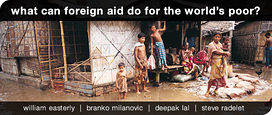In my initial post I mentioned that real aid (unrequited transfers to unattached individuals in foreign countries, and loans with a large concessional element) is often intentionally bundled together with other “things” like quasi-commercial loans, and even loans with many conditionalities, as most of World Bank’s and all of IMF’s loans are, to give the appearance of a larger “aid” flow.
Today, I read in a Washington Post editorial that the Hudson Institute has done a new study of U.S. foreign aid that takes this arbitrary piling up of everything under the sun as “aid” one step further. They treat as “aid” remittances transferred by foreign (or American) nationals to attached individuals in their home countries. US foreign aid thus comes close—thanks to the large remittance flows—to 0.7 percent of GDI, the thirty-year old target to which the rich world had committed itself on paper but of course had never come close to fulfilling (with one or two Nordic exceptions).
Clearly the potpourri of funds and motivations that are labeled aid is likely to keep on growing. Perhaps soon another institute will label all foreign investments aid as well; foreign investment creates jobs in faraway places, doesn’t it? Now, back to remittances. I do not know if the authors of the Hudson report (which I have not read; I only saw a summary in today’s Washington Post) had ever talked to anyone to who sends remittances home (I do send them, by the way) but if they did, they would have realized two things.
First, remittances are not philanthropic transfers. They are most often part of a long-term quid pro quo relationship between nuclear and extended family members and even friends in the “old country” and worker in the United States (or Germany, or France). In exchange for remittances, the worker gets a score of small services that the family members or friends back home do for him: keep on eye on his house, take care of his aging parents, deal with local administration, buy and send him local books that he would like to read, new movies he would like to watch, local food etc. Each of these services cannot be paid one by one, as if a commercial entity were rendering them. They go unpaid. Should a person in the Philippines send a bill to his cousin in the United States charging him a per-hour rate for the time spent waiting for some government paper that the latter needs? Should a cousin send a bill for caring for worker’s ailing parents? But they are being performed under the implicit assumption that the person residing in the United States will from time to time help financially his cousins or friends.
Second, those who classify remittances as foreign aid are unaware that in all studies of welfare, the key welfare-sharing unit is household. Transfers within households do not fall under the normal market rules that transfers between individuals and the rest of the world (=market) do. This is why we do not include unpaid work of housekeeping in gross domestic product, or parents doing children’s homework, or my son fixing the garage door. Similarly, transfers of money within household or extended household just because members of the household live in different countries are not different from transfers of money between these members when they live in the same country. Our family welfare is the same whether I give $10 to my son to spend it on a movie, or use $10 to buy coffee for me and my wife.
This bring me back to what the correct definition of aid is: unrequited transfers (that is, transfers that are not expected to be paid back) to organizations or people in foreign countries with whom we do not have continuing and close relationship; that is, to the people who are in principle unknown to us and whom we want to help out of philanthropy.
It is worth pointing that the misuse of remittances in this respect is not something altogether new. It is for example appalling that the U.S. government puts severe limits to the transfer of remittances by (among others) Cubans living in this country to their family and cousins in Cuba. It made me think of a Stalinist system where people are treated as if they are state owned. Here too, the US government seems to treat Cubans (many of whom are U.S. citizens) as if it owned them, and has the right to prevent them from transferring their own money to their own family members. Using this example, we can easily see how stark is the difference between remittances and aid. The U.S. government would be perfectly within its rights to ban (say) any humanitarian and other aid to whatever country it does not like and not to allow U.S. citizens to contribute to it. This is exactly what is currently happening with the ban to contribute to many Islamic associations that, according to the U.S. government, combine charity and arms-dealing, or perhaps even engage in terrorism. But it is an altogether different and shocking thing to prevent citizens to give money to their own wives, husbands, children, mothers and fathers. This is why that money cannot be labeled “foreign aid” by any stretch of imagination.

